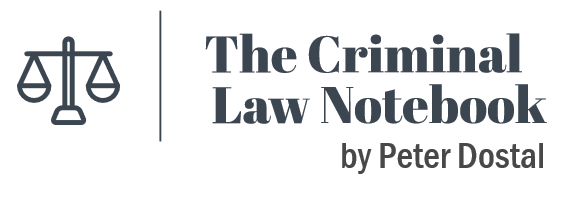From Criminal Law Notebook
|
|
| Line 26: |
Line 26: |
| ; Evidence that generally is prohibited by Rules of Evidence | | ; Evidence that generally is prohibited by Rules of Evidence |
| * {{Box}} [[Hearsay]] | | * {{Box}} [[Hearsay]] |
| | * {{Box}} Question seeks answer NOT in direct knowledge of the accused |
| * {{Box}} Asking witness for expert opinion (see [[Expert Evidence]]) | | * {{Box}} Asking witness for expert opinion (see [[Expert Evidence]]) |
| * {{Box}} Eliciting Privileged information (see [[Solicitor-Client Privilege]]; [[Informer Privilege]]; [[Litigation Privilege]]) | | * {{Box}} Eliciting Privileged information (see [[Solicitor-Client Privilege]]; [[Informer Privilege]]; [[Litigation Privilege]]) |
Revision as of 19:46, 31 August 2021
Checklist
- See also: Examinations-in-Chief and Cross-Examinations
- General Irrelevance (see Relevance)
- ☐ Eliciting evidence supporting a Motion not before the Court
- ☐ Contradicting Collateral Facts (see Collateral Fact Rule)
- Premature Evidence
- ☐ No foundation/Assumes facts not proven
- ☐ Eliciting evidence supporting a Motion not before the Court
- Improperly Phrased Questions
- ☐ Compound Question
- ☐ Vague/Misleading question
- ☐ Misquoting prior evidence/statement
- Uncivil Questions
- ☐ Asked and answered
- ☐ Badgering, harassing witness
- ☐ arguing with witness
- ☐ Monologuing/Editorizating
- Evidence unconnected to incident at issue
- Evidence that generally is prohibited by Rules of Evidence
- Evidence-in-Chief
- Defence evidence
- ☐ Eliciting evidence contradicting Crown evidence without first confronting the Crown witness (Rule in Browne v Dunn)
- Prior Sexual History (assuming enumerated sexual offence)
- Sexual Assault Myths
- ☐ Failure of the complainant to "fight back"
- ☐ Failure of the complainant to "scream" or "call for help"
- ☐ Failure of the complainant to report the assault in a timely manner
|
